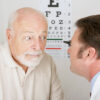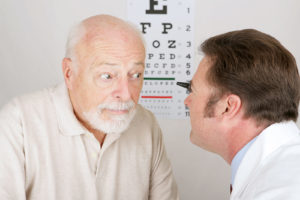
How Increased Vision Problems Affect Health Care Costs
It’s no secret that vision issues are common. According to the World Health Organization, over 2.2 billion people currently suffer from vision impairment or blindness. More importantly, out of those 2.2 billion, one billion could have saved their vision naturally if their problems had been addressed sooner.
 The vast majority of these people experiencing vision issues are over 50, and as our population continues to age, the impact on healthcare costs will be incredibly high. This cost increase will not only burden the individuals experiencing vision loss but also society at large.
The vast majority of these people experiencing vision issues are over 50, and as our population continues to age, the impact on healthcare costs will be incredibly high. This cost increase will not only burden the individuals experiencing vision loss but also society at large.
Since eye problems become a bigger issue with age, the aging population in the United States will continue to see a growing number of people needing eye treatments. For example, in 2011, 2.71 million people suffered from Primary Open-Angle Glaucoma, but that number is supposed to almost triple to 7.32 million by 2050. Statistics like this and more show that eye care will cost more in the future if preventative steps are not taken soon.
The Cost of Eye Care
The cost of eye care in recent years has been enormous. Most medicare plans don’t cover much, or any, vision care, meaning most elderly Americans are forced to pay out of pocket. Something must be done to make vision care more accessible.
Scientists generally agree that to prevent more expensive out-of-pocket costs for our aging population, we must take action to find ways to save our vision naturally.
Gerald Chader, PhD, FARVO, the chief scientific officer at the Doheny Eye Institute at the University of Southern California and medical director of the Ocular Research Symposia Foundation has said, “With an aging world population and startling increases in the prevalence of diseases such as diabetic retinopathy and age-related macular degeneration, we feel that this issue is both important and timely.” These words still ring true.
What Can You Do?
All of this information can be a bit overwhelming for most people. Researchers are hoping not only to spur the scientific community into action by providing this information but also to help people understand the importance of being proactive in taking care of their own eyes. Two of the leading problems with aging eyes are cataracts and macular degeneration. Did you know that you can take steps to reduce your risk for both of these eye conditions and save your vision naturally?
Cataracts
Cataracts are the clouding of the lens of the eye so that it impairs one’s vision. Most cataracts are related to old age, but there are ways to help reduce your risk of developing them. One of the most important ways to reduce your risk of cataracts is through proper diet. Four nutrients that are important to reduce your risk are vitamin C, vitamin E, Lutein, and Zeaxanthin.
Vitamin C is commonly found in citrus fruits, kiwis, strawberries, and guava. Vitamin E is found in tomatoes, almonds, and broccoli. Spinach and blueberries pack a double punch, containing both vitamin C and vitamin E.
Lutein and Zeaxanthin are both found in kale, lettuce, and spinach. Lutein can also be found in eggs. Did you notice that spinach contained all four of these vitamins and nutrients? I guess Popeye was smart to be eating all of that spinach! He probably didn’t develop any cataracts as he got older.
Macular Degeneration
Macular degeneration occurs because of damage to the retina. The damage results in blurred or dead spots within the field of vision. The damage comes in the form of dead photoreceptors or the leaking of blood vessels into the retina. Macular degeneration usually occurs slowly and each eye is affected at different rates.
To combat macular degeneration through diet, make sure you are getting adequate amounts of vitamin C, vitamin E, zinc, and beta carotene. We covered vitamins C and E earlier; to get zinc into your diet, add oysters, yogurt, beef, and oatmeal. To get more beta carotene into your diet, add carrots, sweet potatoes, and pumpkin.
Exercising in general can also reduce the risk of macular degeneration. Studies show that even going for a walk three times per week can reduce your risk for this disorder by nearly 70 percent. Of course, any cardiovascular exercise will have this effect – so run, bike, walk, and swim to your heart’s content.
Reducing the Risk for Both
As you can see, a proper diet will help reduce your risk of developing these common, debilitating conditions. Besides diet, there are a couple of other steps you can take which will reduce your risk. One of the biggest threats to your vision is smoking. It contributes to both of these eye conditions. The other biggest risk factor is UV damage, so protect your eyes from sun exposure. Sun exposure can contribute to the development of both macular degeneration and cataracts.
Eye Exercises
You can also reduce your risk of developing macular degeneration, cataracts, and other vision issues by practicing eye exercises. Try one of the exercises below to start improving your vision today, and you just might save yourself a lot of money down the road.
Round the Clock
To try this exercise, close your eyes and envision a clock in your head. Rotate your eyes up to the 12 and then down to the 6. Repeat this exercise 15-20 times daily to improve and strengthen your eyesight.
Mindful Blinking
With so many of us spending so much time behind a screen these days, it’s actually very easy to forget to blink. This can be incredibly harmful to your eyesight down the road, so it’s important to remember to blink!
Add mindful blinking to your routine by stopping work for a few minutes at the top of each hour. Spend these minutes blinking every three to four seconds to refresh your eyes and prevent dry eye. Preventing dry eye now can actually help if you do need cataract surgery down the road – dry eye can make the surgery recovery process much more difficult.
Adding these exercises to your routine can significantly reduce your risk of developing vision problems later in life. You can also consider adding the Rebuild Your Vision Ocu-Plus Formula to your supplement regimen to protect your eye health. Not only will these steps save you money once you retire, but they will also help you to enjoy a happier, healthier lifestyle. Every little step you take now is an important one toward better vision throughout your life.
Our Rebuild Your Vision Ocu-Plus Formula Contains All 17 Vitamins, Minerals, and Herbal Supplements to Improve Your Eye Health!












Leave Your Reply